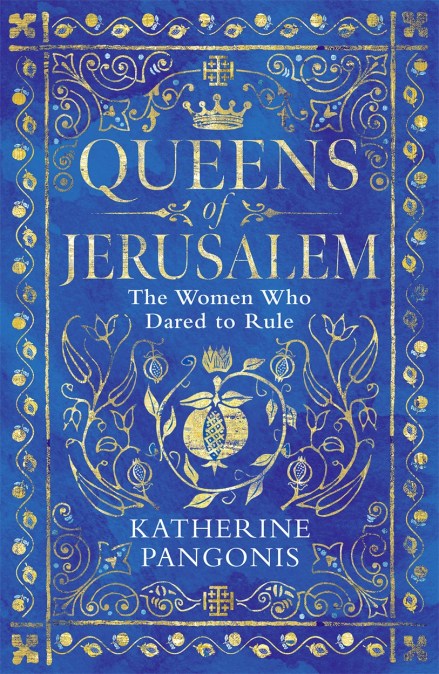In 1187 Saladin’s armies besieged the holy city of Jerusalem. He had previously annihilated Jerusalem’s army at the battle of Hattin, and behind the city’s high walls a last-ditch defence was being led by an unlikely trio – including Sibylla, Queen of Jerusalem. They could not resist Saladin, but, if they were lucky, they could negotiate terms that would save the lives of the city’s inhabitants.
Queen Sibylla was the last of a line of formidable female rulers in the Crusader States of Outremer. Yet for all the many books written about the Crusades, one aspect is conspicuously absent: the stories of women. Queens and princesses tend to be presented as passive transmitters of land and royal blood. In reality, women ruled, conducted diplomatic negotiations, made military decisions, forged alliances, rebelled, and undertook architectural projects. Sibylla’s grandmother Queen Melisende was the first queen to seize real political agency in Jerusalem and rule in her own right. She outmanoeuvred both her husband and son to seize real power in her kingdom, and was a force to be reckoned with in the politics of the medieval Middle East. The lives of her Armenian mother, her three sisters, and their daughters and granddaughters were no less intriguing.
The lives of this trailblazing dynasty of royal women, and the crusading Queen Eleanor of Aquitaine, are the focus of Katherine Pangonis’s debut book. In QUEENS OF JERUSALEM she explores the role women played in the governing of the Middle East during periods of intense instability, and how they persevered to rule and seize greater power for themselves when the opportunity presented itself.
Queen Sibylla was the last of a line of formidable female rulers in the Crusader States of Outremer. Yet for all the many books written about the Crusades, one aspect is conspicuously absent: the stories of women. Queens and princesses tend to be presented as passive transmitters of land and royal blood. In reality, women ruled, conducted diplomatic negotiations, made military decisions, forged alliances, rebelled, and undertook architectural projects. Sibylla’s grandmother Queen Melisende was the first queen to seize real political agency in Jerusalem and rule in her own right. She outmanoeuvred both her husband and son to seize real power in her kingdom, and was a force to be reckoned with in the politics of the medieval Middle East. The lives of her Armenian mother, her three sisters, and their daughters and granddaughters were no less intriguing.
The lives of this trailblazing dynasty of royal women, and the crusading Queen Eleanor of Aquitaine, are the focus of Katherine Pangonis’s debut book. In QUEENS OF JERUSALEM she explores the role women played in the governing of the Middle East during periods of intense instability, and how they persevered to rule and seize greater power for themselves when the opportunity presented itself.
Newsletter Signup
By clicking ‘Sign Up,’ I acknowledge that I have read and agree to Hachette Book Group’s Privacy Policy and Terms of Use
Reviews
The subjects of this important and inspiring book have regularly been resigned to the footnotes of history. But the Queens of Jerusalem are history-makers, game-changers. Delight in their company in this seminal and scintillating debut
Recent scholarship has transformed understanding of the role of women in the European Middle Ages. Now Kate Pangonis's careful yet lively and engaging study focuses light on the public, domestic and social place of noble and royal women in the unique political and dynastic circumstances of the multi-cultural crusader states of the Levant. In a refreshing shift of historical emphasis, these women, whether players or pawns, are brought to life on their own terms, their experiences and careers, even if shaped by men, viewed from a distinctive feminine perspective
A colourful and engaging narrative...Queens of Jerusalem explores some truly fascinating stories about women that deserve to be retold
Beautifully constructed, highly intelligent, perceptive, humane and empathetic, this wonderful book turns the forgotten women rulers of Jerusalem from powerless broodmares into complex actors with agency, ingenuity and fascinating lives
Fascinating, intriguing, exciting and authoritative. Here are the female rulers of the crusader states as shrewd politicians, warrior queens and mothers and wives, holding their own against male crusader states and Islamic warlords in the ruthless arena of the Middle East. The female crusader potentates have long been neglected, so this is long overdue and it was worth waiting for
Picturing Melisende, and other medieval queens, is not easy. As with the images in the gilding, the historian must get close to the texts, angle them this way and that, and seek out traces of their subjects. But as Katherine Pangonis makes clear in this vivid history, the effort is worthwhile, adding depth and unexpected detail to the understanding of the past.
In her debut book Queens of Jerusalem: The Women Who Dared to Rule, historian Katherine Pangonis brings to life the stories of the female rulers of the Outremer (also known as the Crusader States) who have thus far been dismissed by history...Pangonis does an excellent job of contextualising the circumstances that led these women to forge their own alliances and make shrewd political and military decisions to seize power, both successfully and unsuccessfully. It is an impressive feat, considering that the majority of them are barely mentioned in existing historical sources. This book is an enjoyable read that finally addresses the crucial role of royal women in crusader history





